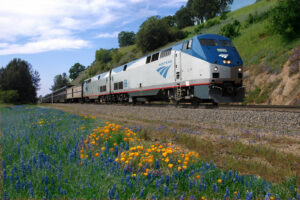DETROIT/LOS ANGELES — Biden administration officials hosted labor contract talks late on Wednesday to avert a potential rail shutdown that could disrupt cargo shipments and impede food and fuel supplies, but one small union rejected a deal and Amtrak canceled all long-distance passenger trips.
Railroads including Union Pacific, Berkshire Hathaway’s BNSF and Norfolk Southern have until a minute after midnight on Friday to reach deals with three holdout unions representing about 60,000 workers before a work stoppage affecting freight and Amtrak could begin.
Talks between labor unions and railroads, which started at 9 a.m., were still underway more than 12 hours later after 9 p.m. ET on Wednesday at the US Labor Department’s headquarters in Washington.
The talks are being overseen by Labor Secretary Marty Walsh, with input from other US officials. The parties ordered in Italian food for dinner Wednesday in order to continue discussions.
“Everybody is going to have to move a little in order to get a deal done,” Transportation Secretary Pete Buttigieg told reporters on the sidelines of the Detroit auto show.
A union representing about 4,900 machinists, mechanics, and maintenance personnel said on Wednesday its members voted to reject a tentative deal.
Rail workers have gone three years without a raise amid a contract dispute, while rail companies have recorded robust profits.
In the current talks, the industry has offered annual wage increases from 2020 to 2024, equal to a 24% compounded hike. Three of 12 unions, representing about half of the 115,000 workers affected by the negotiations, are asking for better working conditions.
Two of those 12 unions, representing more than 11,000 workers, have ratified deals, the National Carriers’ Conference Committee (NCCC), which is bargaining on behalf of railroads, said on Wednesday.
Unions are enjoying a surge of public and worker support in the wake of the pandemic, when “essential” employees risked coronavirus disease 2019 (COVID-19) exposure to keep goods moving and employers reaped hefty profits, labor and corporate experts say.
A shutdown could freeze almost 30% of US cargo shipments by weight, stoke inflation, cost the US economy as much as $2 billion per day and unleash a cascade of transportation woes affecting the U.S. energy, agriculture, manufacturing and retail sectors.
White House spokeswoman Karine Jean-Pierre told reporters aboard Air Force One that a shutdown of the freight rail system would be an “unacceptable outcome for our economy and the American people and all parties must work to avoid just that.”
HIGH STAKES FOR BIDEN
President Joseph R. Biden, Jr.’s administration has begun making contingency plans to ensure deliveries of critical goods in the event of a shutdown.
The stakes are high for Mr. Biden, who has vowed to rein in soaring consumer costs ahead of November elections that will determine whether his fellow Democrats maintain control of Congress.
“Unless they reach a breakthrough soon, rail workers will go on strike this Friday. If you don’t think that will have a negative impact on our economy … think again,” said US Senator John Cornyn, a Republican and Biden critic.
Senator Bernie Sanders late on Wednesday objected to a Republican bid to unanimously approve legislation to prevent a rail strike, noting the profits the rail industry has made.
If agreements are not reached, employers could also lock out workers. Railroads and unions may agree to stay at the bargaining table, or the Democratic-led US Congress could intervene by extending talks or establishing settlement terms.
House of Representatives Speaker Nancy Pelosi said it was not clear whether Congress would step in, noting that the main issue is a lack of sick leave for workers.
Amtrak, which uses tracks maintained by freight railways, said it would cancel all long-distance trips on Thursday and some additional state-supported trains.
Rail hubs in Chicago and Dallas were already clogged and suffering from equipment shortages before the contract showdown. Those bottlenecks are backing up cargo at US seaports by as much as a month. And, once cargo gets to rail hubs in locations such as Chicago, Dallas, Kansas City and Memphis, Tennessee, it can sit another month or longer.
Package delivery company United Parcel Service, one of the largest US rail customers, and US seaports said they are working on contingency plans.
Meanwhile, factory owners are fretting about idling machinery while automakers worry that a shutdown could extend vehicle buyer wait times. Elsewhere, food and energy companies warn that additional service disruptions could create even sharper price hikes. — Reuters

